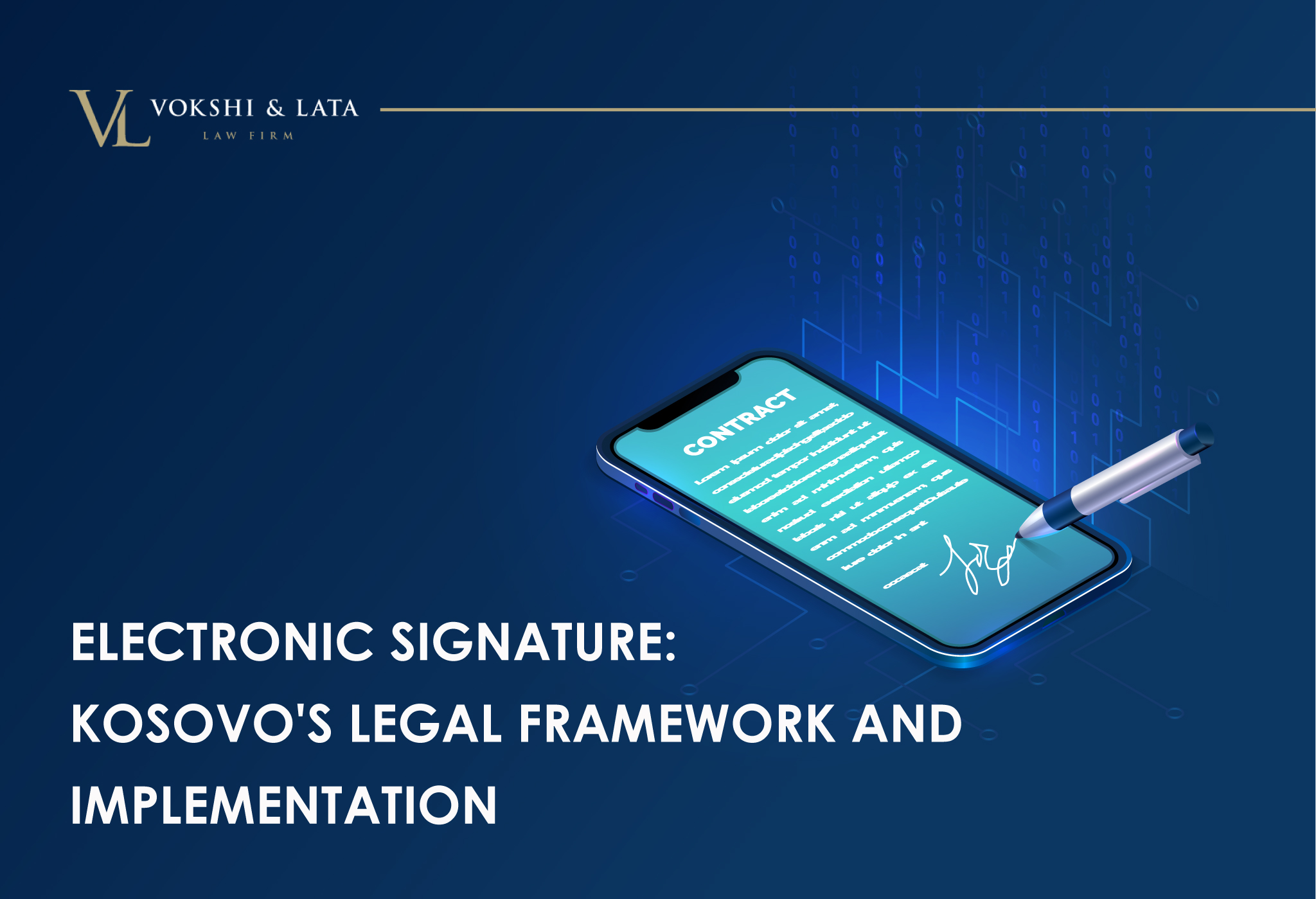ELECTRONIC SIGNATURE: KOSOVO’S LEGAL FRAMEWORK AND IMPLEMENTATION

Author: Valmir Haziraj
Healthcare, education, sales, procurement, and governance are some fields that will significantly benefit from using electronic signatures. With the advancement of technology and digitalization, our daily lives have changed, making electronic signatures increasingly important. They not only enhance efficiency and security in electronic transactions but also simplify many administrative and legal procedures.
Given the importance of signatures in identifying individuals, it was necessary to establish a legal framework for implementing electronic signatures.
In 2014, the European Union approved Regulation (EU) No. 910/2014 of the European Parliament and of the Council on electronic identification and trusted services for electronic transactions within the internal market, repealing Directive 1999/93/EC.
Similarly, in the Republic of Kosovo, Law No. 08/L-022 on Electronic Identification and Trusted Services in Electronic Transactions came into force in January 2022.
This law regulates the methods and schemes of electronic identification in Kosovo, the conditions for using signatures, seals, timestamps, and their creation devices, as well as registered electronic services for judicial and other procedures. It also sets out the conditions for issuing and using qualified certificates for certifying services and authenticating websites, trusted services in electronic transactions, and electronic documents.
Following the law’s enactment, additional relevant regulations were issued to facilitate its implementation. Now, businesses, institutions, and citizens of the Republic of Kosovo have the opportunity to register their services with the Ministry of Economy.
The Kosovo law has determined that the electronic signature is valid and acceptable and cannot be denied validity or evidentiary weight solely because it is in electronic form. By giving this protection and legal power to electronic signatures, the Republic of Kosovo has made remarkable progress in facilitating the creation of relationships in various fields, not only between individuals but also between legal entities.
According to the law, electronic signatures can be used in all areas of life, except in specific cases where its use is not allowed, such as:
- Family law and inheritance matters, which are subject to special legal requirements;
- Legal actions requiring public legalization, notarial acts, or court authorization;
- Legal actions related to property guarantees for conditional releases;
- Where the use of electronic signatures is not permitted by a special law.
In all other cases, an electronic signature cannot be denied validity solely because it is in electronic form. On the contrary, the law specifies that, for an electronic signature to be considered invalid, it must be proven that it did not meet the security requirements established by law and other secondary acts.
Despite the well-established legal framework, electronic signatures are still not widely used by businesses and individuals in Kosovo. One reason for this is the hesitation of state institutions to accept electronically signed documents as valid. This underscores the need for training public institution staff on the validity and legal framework surrounding electronic signatures.
In addition, awareness campaigns should be undertaken by state mechanisms to educate the country’s citizens and businesses about the possibilities, ease, and validity of electronic signatures.
On the other hand, it is worth noting that there is a growing trend in the private sector, particularly among foreign investors, in the use of electronic signatures. The private sector has always been more willing and enthusiastic about new developments and has followed with great interest the creation of such a regulatory framework as this for electronic signatures.
It is also important to assess the readiness of relevant institutions to certify or recognize the certificates of other entities, allowing the private sector to offer such services, as they have shown a willingness to do so.
In Kosovo, we now have certified providers of electronic signatures, electronic seals, electronic certificates, and digital identity services for citizens, businesses, and web servers. Through these platforms, you can create a digital identity recognized throughout the European Economic Area and the Republic of Kosovo. This identity will be created in compliance with all local legal provisions and in alignment with the European Union’s eIDAS Regulation 910/2014.
As you can see, electronic signatures represent an important step towards digitalization and efficiency in communication and the fulfillment of obligations between parties in Kosovo. The new legal framework has established a strong foundation that ensures the validity and security of electronic signatures, thereby facilitating Kosovo’s smoother integration into the European internal market.
Although challenges remain, the adoption and recognition of such technologies by institutions and businesses will enhance transparency, efficiency, and security in all electronic transactions, delivering significant benefits to the citizens and economy of Kosovo.
The enthusiasm and commitment of the private sector indicate a promising future, especially now that there is a legal framework in place to qualify, recognize, and protect electronic signatures.
